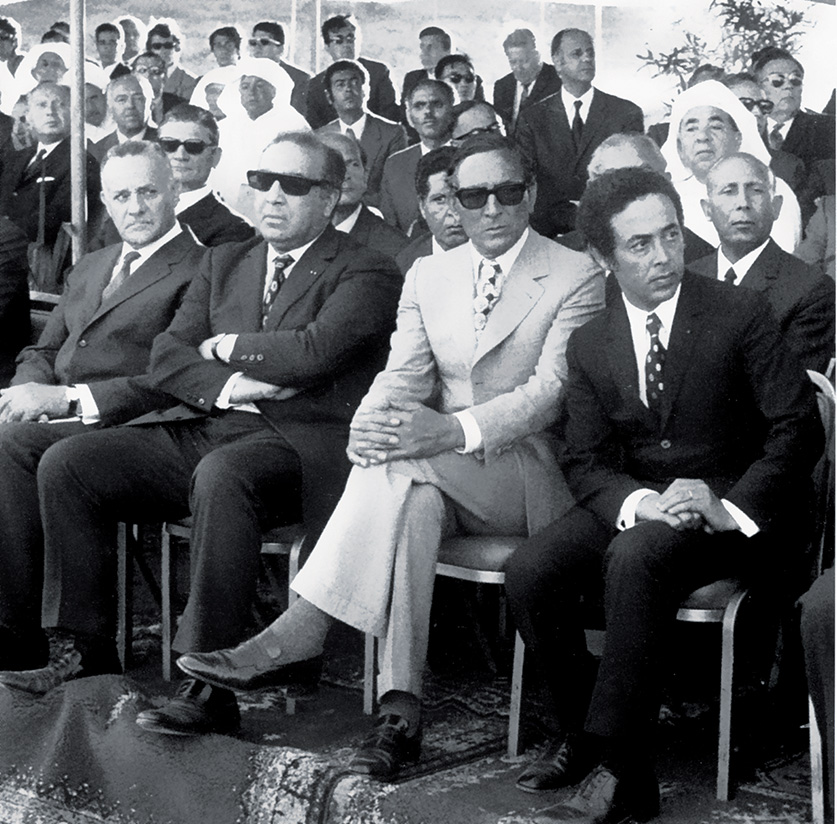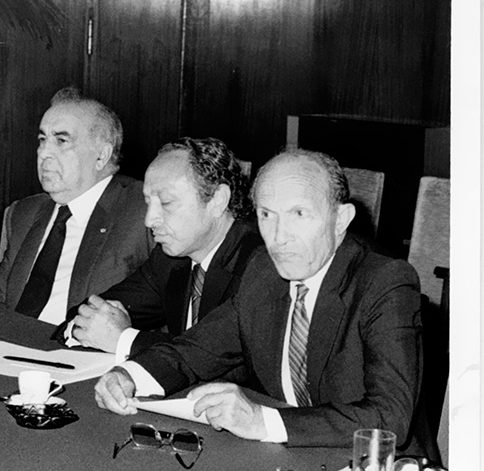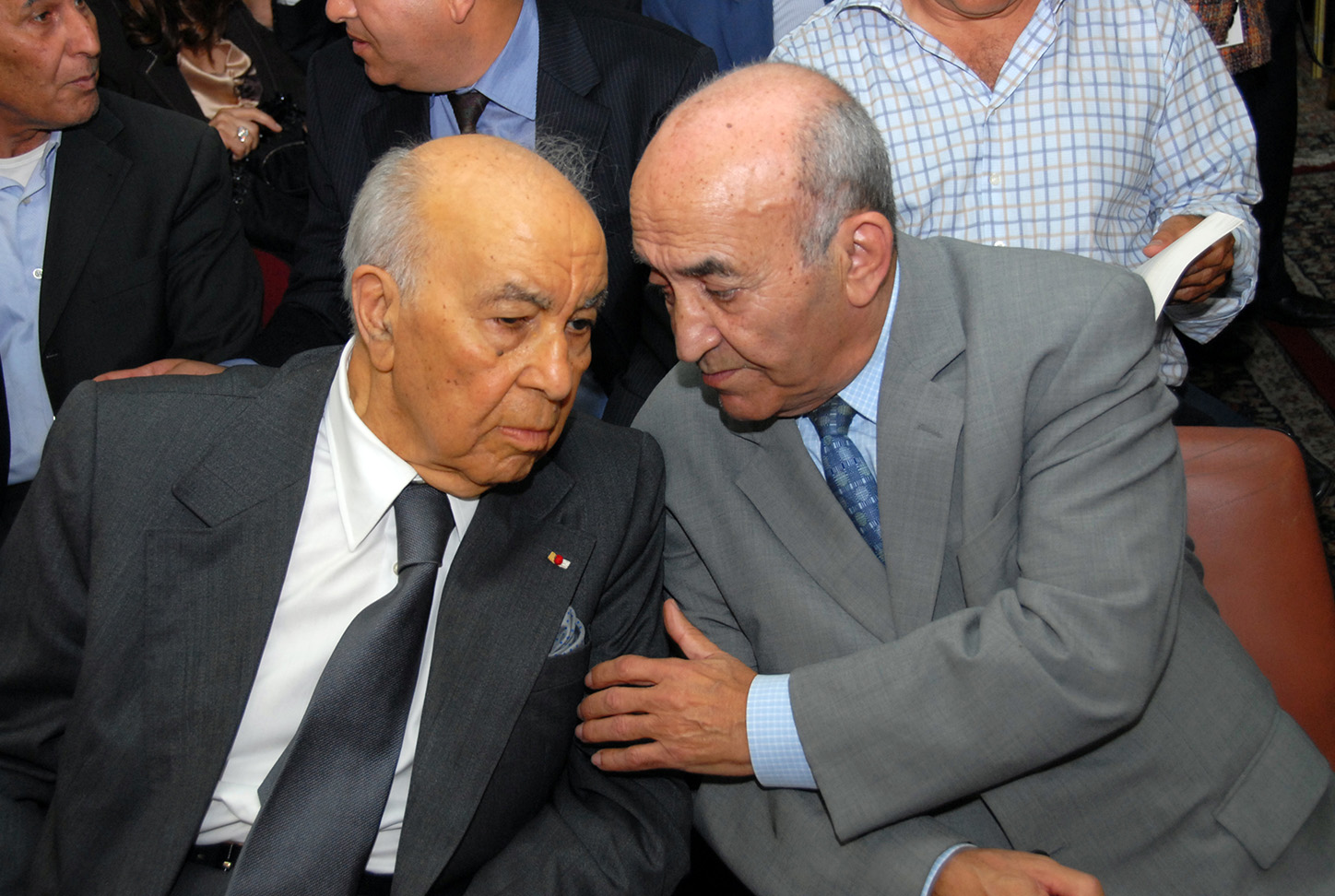He was known as the man with the cigar. A repeat prime minister under Hassan II and director general of the Office Chérifien des Phosphates (OCP) for over two decades, the name Karim Lamrani evokes wealth, power, and discretion. A senior statesman, the kingdom’s first technocrat. A strongman of the reign for some, a reassuring figure for others… Above all, Karim Lamrani was the prime minister of transitions, dispatched by Hassan II whenever the king found himself in troubled waters. In August 1971, as Morocco was still reeling from the attempted coup in Skhirat, Lamrani—who had previously served as Minister of Economy and Finance—took on his new role as prime minister with composure and confidence. « No one wanted this responsibility, » recalled a minister from the time. « The entire political class was jittery, trapped in the paranoia of the failed coup. » Lamrani, however, accepted without hesitation, ready to serve his country like a soldier marching into battle.
Archive: Report published in issue 603 of TelQuel.
From Boujloud to OCP
Karim Lamrani was not born with a silver spoon in his mouth. In the depths of the old medina of Fez, he grew up without a father, taken in by a wealthy uncle who set him up with a shop in the alleys of Boujloud. From the end of middle school, young Lamrani sold radios, favoring commerce over studies. « A few meters from his shop was my father’s store, where he sold cereals, » recalls Mohamed Lahbabi, who would occasionally cross paths with Lamrani when visiting his father. Lahbabi would later go on to co-found the UNFP, the predecessor of the USFP, alongside Abderrahim Bouabid and Mehdi Ben Barka. A twist of fate that would shape the trajectory of Morocco’s future prime minister.
In the early years of independence, Lamrani thrived in Casablanca. A self-taught businessman, he had been mingling with the French for years, making deals, building his fortune, laying the foundation for Moroccan private capitalism, and—perhaps unknowingly—reaping the first rewards of the postcolonial state. Meanwhile, Lahbabi was a member of Bouabid’s cabinet; Bouabid himself was Minister of National Economy under the government of Bekkay Ben M’Barek Lahbil. « One of our first tasks was to take control of the OCP, » Lahbabi explains. « Bouabid asked me if I knew any young Moroccans who had experience with French business circles. I immediately thought of Karim Lamrani. »
The young businessman, based on Rue Magellan in Casablanca, welcomed Lahbabi and agreed to come to Rabat to serve as the secretary-general of the OCP, handling its administrative affairs. « A month later, » Lahbabi recalls, « he came back to see me: he was being asked to deal with the case of a chaouch who had a pension issue, and that of a muezzin in Rabat. He asked me, ‘Is this what the OCP is?’ »
Lahbabi informed Bouabid, who gave him full discretion. All the Office’s files were handed over to Lamrani, leading to the resignation of Jacques André Bondon, the last French director-general. « We then appointed M’hamed Zghari, a prominent figure of Istiqlal in Fez, as head of the OCP, » Lahbabi continues. However, he hints that this appointment was mostly symbolic, emphasizing the central role of Karim Lamrani, who had become the true strongman of the OCP. It was not until 1967 that Lamrani was officially appointed director-general, working alongside Abraham Serfaty, who had been brought into the OCP by none other than Mohamed Lahbabi himself…
Modern management
« Karim Lamrani was not a member of Istiqlal. At best, he was a sympathizer of the national movement, » says Lahbabi. He was close to the pioneers of the movement but never formally joined. While some were fighting for independence, he was deeply engrossed in business. He preferred practical tasks over politics and worked relentlessly. « He literally fell in love with the OCP. One night, while I was staying at his house, he was tapping his foot in his sleep. When he woke up, he told me he had been dreaming of a train carrying phosphate, » recalls Lahbabi.
« He was known for being a good administrator, a man of consensus, » explains Hassan Aourid. For the political analyst, who met him several times and closely followed his career, Karim Lamrani stood out by « bringing private-sector methods into the public sphere and creating a new style of management. »
« At the OCP and in government, he was always a talent scout. He knew how to surround himself with brilliant minds and young talent, » Aourid emphasizes, adding: « Lamrani was among those who laid the foundation for Moroccan capitalism, following the principles of modern economics. As a true patriot, he had a vision for Morocco and believed, like many others, that the path to modernization was through industrialization. »
Not a politician but a shrewd strategist, Karim Lamrani, the country’s first true manager, introduced an entrepreneurial culture into the kingdom’s public institutions while continuing to pursue his business ventures.
A man of influence
A man of the world, always seen with his signature cigar and a glass of whisky, Lamrani—more fluent in French than Arabic—enjoyed going out and entertaining. He relished the lavish lifestyle and bourgeois soirées. Well regarded by both the financial elite and the political class, he even managed the rare feat of maintaining good relations—at least as much as possible—with the country’s unions and activists. « He never raised his voice, put his colleagues at ease, and always had a joke to tell, » recalls a former minister from Lamrani’s cabinet. « At the end of a workday, he made it a point of honor to have an empty desk, ensuring that he had handled every accumulated file, » the source adds. The same qualities that defined Lamrani’s success in business and at the OCP were those he brought to his role as prime minister: knowing how to surround himself with the right people, delegating responsibility, and offering reassurance. Even those who disliked him—describing him as a ruthless predator when someone encroached on his territory—acknowledged his managerial skills. « He had the firm hand needed to lead a government. He mastered his domain as if he had received the necessary education, » says another member of his team.
« He had a favorite saying that summed up his character: li ma3endo flouss, klamo messous (the one who has no money, his words don’t count),” confides our source. Karim Lamrani wore many roles. He was a self-made man who managed to balance government administration with the advancement of his personal business ventures, as well as a technocrat with political roots. By associating with Bouabid and others, he navigated the worlds of politics, business, and public administration with ease. « Undoubtedly, his success in business worked in his favor within the establishment, » analyzes Hassan Aourid. « But above all, the fact that he was not politically affiliated helped him immensely. In times of transition, when the political horizon was unclear, he was Hassan II’s wild card. »
The trust of Hassan II
But above all, Lamrani had the king’s ear. « He was the only one whom Hassan II did not address as ‘Si Karim’ in public, but simply ‘Karim,’ » notes a source. When he was first appointed prime minister, Lamrani was already holding the strategic position of director of the OCP, a role he would maintain until 1990. He simultaneously occupied both positions, and no one found it unusual. « At the time, being the director general of the OCP was more important than being prime minister, » explains a former colleague. « He didn’t involve himself in politics, and Hassan II knew it. Lamrani was already wealthy and wasn’t seeking power. Because of this, the king gave him significant leeway. He trusted him to be loyal and effective. » To illustrate the monarch’s confidence in his prime minister, a source close to the royal inner circle shares: « After the second coup attempt, Hassan II feared for his life. He appointed a regency council, responsible for overseeing the education of the crown prince in case something happened to him. It was composed of ulema and major public figures. Lamrani was among them. »
Both unassuming and competent, wealthy and influential, Lamrani seemed to serve as both an economic pillar and a public figure for Hassan II. « He was an executor of Hassan II’s will, and he never hid it. He wasn’t the man for handling crises—that was Basri, » describes Mohamed Lahbabi. More technician than politician, more manager than technocrat, Lamrani’s mission was to maintain a respectable image and stabilize the country’s economy in the absence of a clear majority or whenever the throne seemed at risk. More than a prime minister, he was, in effect, Hassan II’s shadow finance minister. In 1976, a few months after the Green March and the Madrid Accords, it was Lamrani whom the king, concerned about the repercussions of the war with the Polisario, sent to Washington to meet with Kissinger. « Two weeks later, » writes Azzedine Layachi, a specialist in African and Middle Eastern affairs, « Kissinger informed Congress that Morocco would be sold a squadron of twenty-four Northrop aircraft for $120 million, along with armored vehicles worth $36 million. »
Time of austerity
A few years later, Hassan II called him back to once again take the reins of government. On November 30, 1983, the liberal known for his ability to smooth out tensions became the prime minister responsible for implementing the structural adjustment program, which he negotiated with international financial institutions and was tasked with enforcing. Lamrani’s mission was to restore public finances, promote fiscal discipline, reduce expenditures, and increase revenue. Those who worked with him during this period remember his “natural authority,” his “entrepreneurial mindset,” and his “complementarity with Hassan II.” The king was political and ostentatious; the prime minister was logistical and discreet. However, Moroccan writer and regime opponent Moumen Diouri saw him in a different light: a Makhzen billionaire appointed to enforce an austerity plan. In A qui appartient le Maroc?, he writes that the structural adjustment program “remains silent on what are known as ‘unproductive sources of accumulation’: speculative capitalism and the corruption eating away at the economy. Around the extravagance of the ‘king’ and his family, enormous fortunes were amassed scandalously (like that of Karim Lamrani, Prime Minister and head of the OCP in 1984), while extreme poverty spread across the country.”
Operation « Lamranization »
Lawyer Brahim Rachidi explains: « Some businessmen are criticized for having built their fortunes thanks to the 1973 Moroccanization measures. » At the time, “Lamranization” even became a derogatory term used to describe Moroccanization. In Maghreb: Enlisement ou nouveau départ?, published in 1996, the team of Franco-Egyptian economist Samir Amin details: « Capital concentration has reached such a level that three groups currently dominate the country’s economic life: ONA, the Karim Lamrani group, and the Moulay Ali Kettani group. The activities of these groups largely shape the overall structure of the economy. They capture a significant share of economic surplus, especially since the monopolies held by certain companies in key sectors allow them to generate considerable rents. » After Hassan II, Karim Lamrani was considered the wealthiest man in the kingdom. In 1996, his fortune was estimated at $2.5 billion, according to Ali Ben Haddou’s book L’empire des sultans (Riveneuve Editions).
Waiting for the transition
Lamrani returned to the position of prime minister for the third time in 1992. While waiting for the political transition and the co-optation of the Koutla leaders, Hassan II entrusted him with steering the government. The most important portfolios, the so-called « sovereignty ministries, » remained unchanged: Abdellatif Filali stayed at Foreign Affairs, Mohamed Berrada at Finance, and Driss Basri at the Interior. « Lamrani was just a front, once again placed in the spotlight to present a good image, while Basri acted as the real viceroy, » comments a veteran of the USFP. In his technocratic government, Lamrani brought in Driss Jettou, one of his most emblematic successors, appointing him Minister of Commerce…
In the midst of Karim Lamrani’s final term, in 1993, the Hassan II Mosque was inaugurated. The prime minister and businessman stood out for his generosity, being presented as the largest patron of its construction, contributing 20 million dirhams—surpassing Moulay Ali Kettani’s 19 million and even Hassan II’s 6 million. Lamrani also played a role in the reconstruction of the medina in his hometown and supported several other public and private projects. He stepped down in 1994, replaced by Abdellatif Filali, and focused on growing his business empire, which he entrusted to his daughter, Saïda, one of the country’s first female entrepreneurs and the most resourceful of his four children. Like him, she seems unwilling to speak to the press, even less so about her father. The silence surrounding one of Hassan II’s most influential figures—whether from those who knew him well or those who might criticize his decisions—feels almost like an unspoken agreement. Still feared and respected, whether for his age, his powerful connections, or his financial empire, Karim Lamrani remains one of the most enigmatic figures in the kingdom.
Written in French by Ayla Mrabet, edited in English by Eric Nielson







